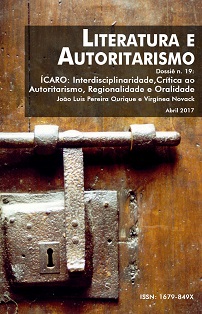Diary of the Fall: From Memories of Anti-Semitism to the violent confrontation between two selves
DOI:
https://doi.org/10.5902/1679849X26600Keywords:
Narrator, Focalization, Time, Diário da Queda, Michel LaubAbstract
Based on assumptions of Literary Theory, Critical Theory and Psychoanalysis, this article presents an analysis of the autodiegetic narrator in the novel Diário da Queda, by Michel Laub. The analysis investigates the possibility of separating the je narrant and the je narré through the autodiegetic focus proposed by the theory of Gérard Genette, considering the idea that time operates an ideological shift between the narrators. Taking into account the presence of the stream of consciousness which reveals the mental process of the narrator of Diário da Queda and its traumatic history, psychoanalytic studies of Sigmund Freud are also relevant for this analysis. Furthermore, authors like Jeanne Marie Gagnebin, Ronaldo Lima Lins and Giorgio Agamben are also into the discussion. This analytical hypothesis indicates that, in the novel mentioned above, the je narrant, when admitting the enunciation (present), reveals features which are not noticed in the je narré (past) - and, thus, the time is considered to be responsible for this change between the two selves. Based on Gagnebin (2006), the impression is that the narrator-protagonist of Diário da Queda dives into its memories about its Jewish origins, trying to understand the past to act on the present, writing about the memories and, finally, being ready to try to overcome a painful past and move on.Downloads
References
ADORNO, Theodor W. Posição do Narrador no Romance Contemporâneo. Trad: Jorge de Almeida. In: Notas de Literatura I. São Paulo: Duas Cidades/ Editora 34, 2003, p.55-63. Disponível em: letrasorientais.ffch.usp.br/...Adorno,%20theodor%20Posição% Acesso em: 14 out. 2015.
AGAMBEN, Giorgio. O que resta de Auschwitz: o arquivo e a testemunha. Trad. Selvino J. Assmann. São Paulo: Boitempo, 2008.
AGUINIS, Marcos. Las Redes Del Odio. 3. ed. Buenos Aires: Planeta, 2004.
FREUD, Sigmund. Moisés e o monoteísmo. Trad. José Octávio de Aguiar Abreu. Rio de Janeiro: Imago, 1975.
FREUD, Sigmund. O mal-estar na civilização. Texto copiado integralmente da edição eletrônica das obras de Freud, versão 2.0 por Tupykurumin. Disponível em Acesso em: 20 abr. 2015.
GAGNEBIN, Jeanne Marie. Memória, História, Testemunho. In: GAGNEBIN, Jeanne Marie. Lembrar, escrever, esquecer. São Paulo: Editora 34, 2006.
GENETTE, Gérard. O discurso da narrativa. Trad. Fernando Cabral Martins. Lisboa: Arcadia, [s.d.].
LAUB, Michel. Diário da queda. São Paulo: Companhia das Letras, 2011.
LINS, Ronaldo Lima. Violência e Literatura. Rio de janeiro: Tempo Brasileiro, 1990.
SCHOLLHAMMER, Karl Erik. Ficção brasileira contemporânea. Rio de Janeiro: Civilização brasileira, 2009.
Downloads
Published
Versions
- 2022-03-16 (2)
- 2017-04-10 (1)
How to Cite
Issue
Section
License
DECLARAÇÃO DE ORIGINALIDADE E EXCLUSIVIDADE E CESSÃO DE DIREITOS AUTORAIS
Declaro que o presente artigo é original e não foi submetido à publicação em qualquer outro periódico nacional ou internacional, quer seja em parte ou na íntegra. Declaro, ainda, que após publicado pela Literatura e Autoritarismo, ele jamais será submetido a outro periódico. Também tenho ciência que a submissão dos originais à Literatura e Autoritarismo implica transferência dos direitos autorais da publicação digital. A não observância desse compromisso submeterá o infrator a sanções e penas previstas na Lei de Proteção de Direitos Autorais (nº 9610, de 19/02/98).






